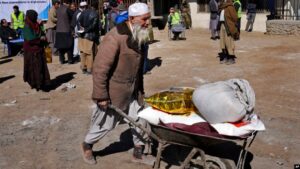KANDAHAR CITY (SW) – Compared to the past years in Kandahar, there has been a significant increase in wheat harvest this year, which has made farmers happy.
Farmers in Daman district of the province, which is known for wheat cultivation, started harvesting wheat last week and are still continuing. A farmer in Kandahar, Mohammad Ebrahim, who was busy with the wheat grown on his land, said that his harvest this year is good. He requests the government to find a market for the sale of wheat.
He told Salam Watandar: “This year, since poppies have been banned, the Islamic Emirate has ordered that they will no longer be planted. A lot of wheat has been planted this year. We call on our officials to order their security forces to return the wheat that is sent to other countries.”
There has been an increase in wheat harvest in Kandahar at a time when the government has imposed a ban on the sale and purchase of drugs in the entire country this year.
Emil Hakimi, the head of agricultural affairs of the Kandahar Department of Agriculture and Livestock, said that wheat has been planted on 95,000 hectares of land in Kandahar this year, and according to estimates, it will yield up to 350,000 tons. He mentioned the absence of diseases and the prevention of drug cultivation as the reason for the increase in wheat yields.
He said: “Generally speaking, compared to other years, this year’s wheat has yielded better than other years. This year, there are no pests or diseases.”
The prices of wheat in the markets have also decreased compared to before.
A resident of Kandahar, Haji Mohammad Salam, said that the price of wheat has fallen compared to the past and the government should create reserves for the harvest of this wheat so that Afghanistan does not face a shortage of wheat in the future. He said: “This year, all the wheat is good and the price is good enough that the price will go down. All the people will be happy. Now the price of wheat is going up again. Anyone who buys wheat will store it.”
A number of other farmers in Kandahar say that they are still growing wheat and harvesting in the old and traditional way, which is hard work and less profitable.
On the other hand, the director of agricultural affairs of Kandahar said that last year the government distributed improved seeds to 50,000 farmers and gave cash assistance to 9,000 others.
The provincial agricultural affairs chief Shamsul Rahman Musa said: “We have distributed improved seeds and fertilizers to around 50,000 farmers and provided cash assistance to 9,000 farmers. With the help of partner institutions, our department of agriculture is also at their service in the field of disease prevention. Diseases have been diagnosed and necessary instructions have been given to control them.”
Shamsul Rahman Musa says that this year, according to a specific plan, a laboratory will be activated in Kandahar to prevent the use of low-quality agricultural drugs, and in the future, cold storage rooms will also be built to protect farmers’ crops.
ENDS







